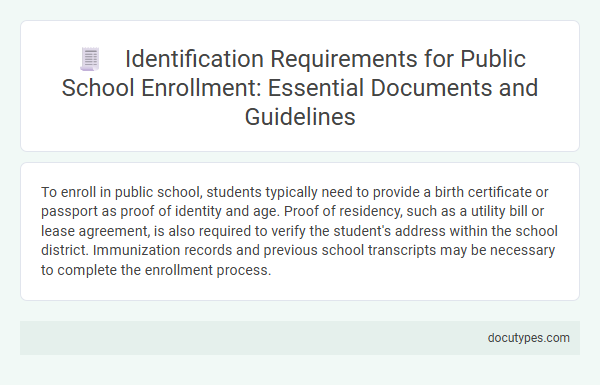To enroll in public school, students typically need to provide a birth certificate or passport as proof of identity and age. Proof of residency, such as a utility bill or lease agreement, is also required to verify the student's address within the school district. Immunization records and previous school transcripts may be necessary to complete the enrollment process.
Introduction to Public School Enrollment Identification
Enrolling in a public school requires specific identification documents to verify a student's eligibility and residency. These documents help the school confirm the student's identity and legal status within the school district.
- Proof of Age - A birth certificate or passport is commonly required to establish the student's age.
- Proof of Residency - Utility bills, lease agreements, or mortgage statements show that your family resides within the school's district boundaries.
- Immunization Records - Up-to-date vaccination documents ensure compliance with state health regulations for enrollment.
Why Identification is Required for Enrollment
Identification documents are essential for enrolling in a public school. They verify your child's identity and eligibility to attend the school.
- Proof of Age - Birth certificates or passports confirm the student's age to place them in the appropriate grade level.
- Residency Verification - Utility bills or lease agreements establish that the student resides within the school's district boundaries.
- Legal Guardianship - Documents like custody papers verify who has the legal right to enroll the child in school.
Schools require identification to ensure accurate records and comply with state enrollment regulations.
Essential Documents for Student Identification
Enrollment in public school requires specific identification documents to verify the student's identity and residency. Essential documents ensure the school can accurately register the student and provide appropriate educational services.
The primary documents typically needed include a birth certificate or passport to confirm the student's identity. Proof of residency is also required, such as a utility bill or lease agreement, to establish the student's local address. Immunization records are often necessary to comply with health regulations and safeguard the school community.
Proof of Age and Birth Certificate Guidelines
Proof of age is a mandatory requirement for enrolling a child in a public school, ensuring the student meets the age criteria for their grade level. A certified birth certificate serves as the primary document for age verification, accepted universally by school administrations. Schools may also require that the birth certificate be an original or a state-certified copy to confirm authenticity and prevent fraud.
Residency Verification and Acceptable Documents
To enroll in a public school, proof of residency is a fundamental requirement. Schools must verify that the student lives within the district boundaries to ensure eligibility.
Acceptable documents for residency verification typically include a utility bill, lease agreement, or mortgage statement showing the parent's or guardian's name and address. Some districts also accept government-issued correspondence or pay stubs with the home address.
Immunization Records: What’s Needed
Immunization records are a critical component of the identification documents required to enroll in public school. These records verify that a student has received the necessary vaccinations as mandated by state and local health authorities.
Schools typically require up-to-date immunization certificates or health department forms signed by a healthcare provider. These documents ensure compliance with public health laws and protect the overall student population from preventable diseases.
Parent/Guardian Identification Requirements
What identification documents are required for a parent or guardian to enroll a child in public school? A valid government-issued photo ID such as a driver's license or passport is typically required. Proof of guardianship or custody documents may also be necessary to establish legal authority.
Handling Non-Traditional or Alternative Documents
Enrolling in a public school typically requires specific identification documents to verify a student's identity and residency. Schools often accept non-traditional or alternative documents when standard forms are unavailable.
- School policy flexibility - Many districts allow alternative documents such as letters from shelters or social service agencies to establish residency.
- Acceptable non-traditional IDs - Documents like birth certificates, baptismal records, or affidavits signed by guardians may be accepted to prove identity.
- Verification procedures - Schools may conduct home visits or require sworn statements to confirm the authenticity of alternative documentation.
Special Considerations for Homeless and Immigrant Students
Enrollment in public school typically requires identification documents such as proof of age, residency, and immunization records. Homeless students are protected under the McKinney-Vento Act, allowing enrollment without standard documentation by using a liaison to verify eligibility. Immigrant students, including those without legal status, must be enrolled regardless of their documentation, as mandated by the Plyler v. Doe Supreme Court decision.
What Identification Documents Are Needed to Enroll in Public School? Infographic

